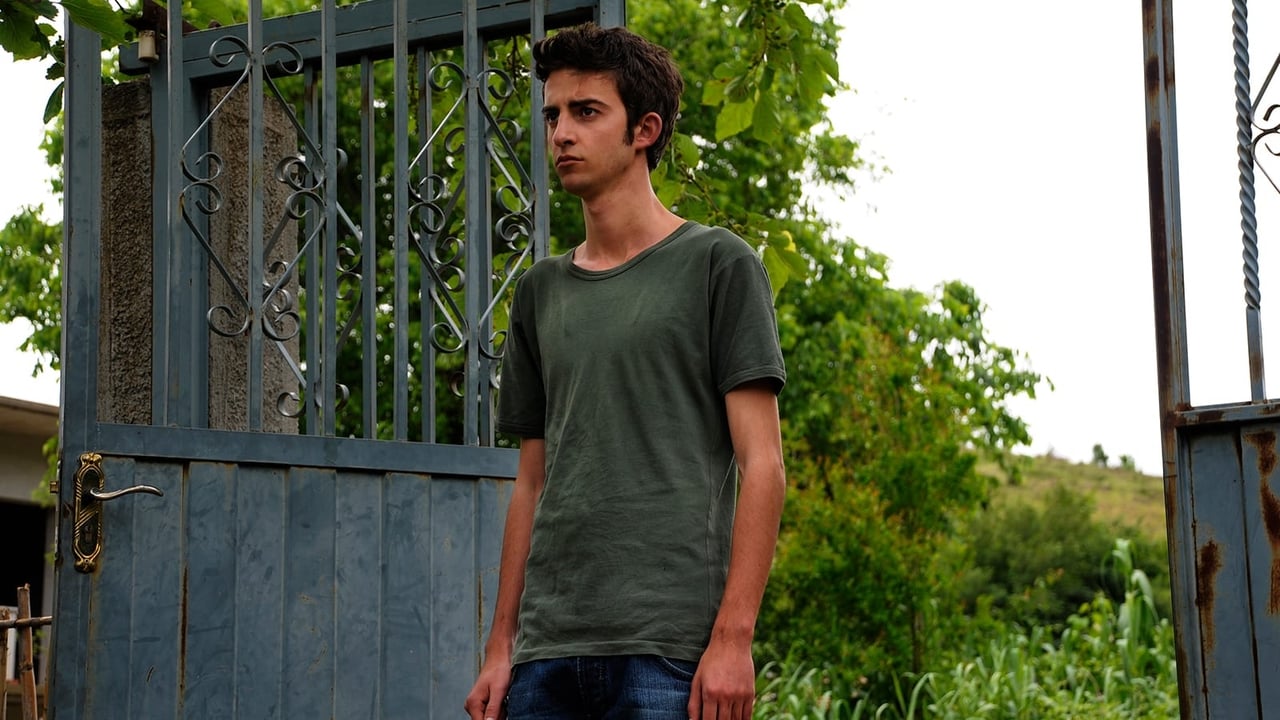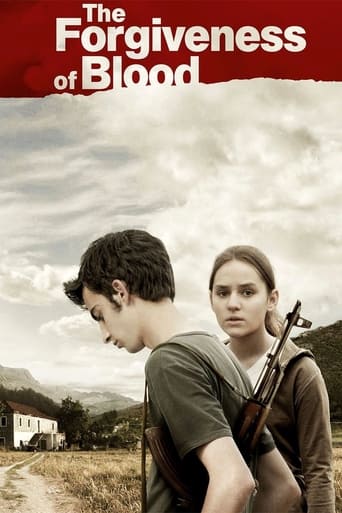



The greatest movie ever made..!
Bad Acting and worse Bad Screenplay
A lot of perfectly good film show their cards early, establish a unique premise and let the audience explore a topic at a leisurely pace, without much in terms of surprise. this film is not one of those films.
View MoreOk... Let's be honest. It cannot be the best movie but is quite enjoyable. The movie has the potential to develop a great plot for future movies
View MoreJoshua Marston, best known as the director of drug mule story MARIA FULL OF GRACE, gives us here a poignant depiction of blood feuds in northern Albania Albania. The script was written in collaboration with Andamion Murataj and the actors are all Albanians, some of them amateurs, speaking the authentic Gheg dialect of their region.Nik (Tristan Halilaj) is in his last year of high school and dreams of opening an internet/computer game café in his small town. His sister Rudina (Sindi Lacej) hopes to go on to university. Their dreams are dashed, however, when their father (Refet Abazi) kills a neighbour in a dispute over land. To avoid revenge attacks from the dead man's family, the males of the family are forced to stay inside their home at all times, a situation that could last for years while the community mediates the feud. With the father out of work, Rudina is forced to drop out of school, deliver a bread route, and buy contraband cigarettes to sell at a profit.Marston and his co-writer are clearly interested in depicting the intersection of two worlds in Albania: mobile phones and cheap motorbikes alongside ancient laws that hold a man's honour sacred. What weakens the film, however, is that nowhere is it made clear that blood feuds are not a typical feature of contemporary Albanian life: while they briefly erupted in the early 1990s after the fall of Communism, and some families still live under them, it is very unusual for one to start today. Without mentioning that things have changed, this film misrepresents Albania and misleads Western viewers towards a Boratish caricature.Note how other reviews here and elsewhere tend to commend the film more for "teaching them something about Albania" than for cinematography or acting. The camera-work is completely unimaginative, lacking any carefully composed tracking shots and depending far too often on a seasick shaky hand-held camera following a walking actor. While the acting isn't outright bad, the deficiencies in the script only make their amateur effort stand out. While life for the men in the family is tedious as they can't step out of the house, this point is already sufficiently made by halfway through the film, and yet the script goes on and on without anything more to say. The ending seems ad hoc and doesn't really follow from the body of the film.
View MoreThis is a small Albanian movie about a blood feud in a small Albanian town. Rudina and Nik are normal kids in a relatively poor family. Their father earn a living delivering bread in the neighborhood. Access to a disputed road causes problems with the neighbor. When the father and a uncle kill that neighbor, only the uncle is caught. The neighbor's powerful family seeks retribution or blood feud. Age old customs causes more and more problems for the young kids who remain.There is an amazing underlying subject being dramatized. The old customs is just harrowing. However the movie moves a bit slow and the power of the situation is dissipated. The other missed opportunity is the actual attack that starts the entire story. It seemed obvious that they needed to show it. The power of brutality itself is needed given the subject of the movie is a blood feud. It seems odd that we're missing that scene.
View MoreDespite the screenplay awards from Berlin and Chicago about a blood feud between families, The Forgiveness of Blood serves only 109 minutes of mostly boredom. The Albanian Kunan code demands that with a murder, a member of the wrongful family must be killed or jailed.Dad is guilty and hiding, young Nik (Tristan Halilaj)is on house arrest, leading both a real and cinematic static life, to the extent that I looked at my watch, a gauche move allowable because I was the only patron in the house. While now and then Nnik ventures out of the house, most notably to see a girlfriend, most of the film is inside the house with nothing dramatic happening except a few bullet shots into the house and a fire.Even with those moments, director Joshua Marston doesn't infuse the action with meaning or analysis. Quickly it's back to waiting until besha (some relief) comes from the aggrieved family. We do get a glimpse of Albanian life, but not enough daily living for culture hounds.To add to the monotony, the shots are largely washed out either because our bulb was not strong or the digital apparatus didn't do what promised to be an interesting visual landscape. I will await the next Albanian film because Forgiveness of Blood holds promise of better stories to come.
View MoreBack in the 15th.Century, a certain prince Leke Dukagjini gathered together a collection of Albanian traditional customs and cultural practices that came to be known as "The Kanun of Leke Dukagjini." This collection was passed down by word of mouth from one generation to the next, and has governed the way Albanians have behaved pretty much ever since. Book Ten section three of the "Kanun of Leke" as it was commonly referred to, deals specifically with the rules in regard to a dispute between one neighbour and another. It states that, should a quarrel between two neighbours, for whatever reason, escalate and turn violent then the victim can invoke the age-old ritual of the blood feud, which states that the victim has the right to kill all males in the perpetrator's family. However, in a somewhat surprising twist, there is also a tradition throughout Albania known as "Besa." Roughly translated, "Besa" means, "to keep the promise" or "word of honour." There's a saying in Albania that says: "Albanians would die rather than break Besa." So while the men remain in their home, and at the discretion of the victim and his family, they will not be killed for the first twenty-four hours the blood feud has been preordained. Joshua Marston's latest film, "The Forgiveness of Blood" – is set in modern day Albania and tells the story of two families caught up in a blood feud. Every day the father and daughter set off in their horse and cart to deliver the bread to the people and café owners in the nearby village. Obviously, they quicker they can deliver the bread the more quickly they get paid. To this end, the father uses a neighbour's land as a short cut. The neighbour resents this and has already placed large stones to deter the father trespassing on his land. The father just removes the stones and goes on his way. The very next day the father finds his access completely blocked, with the neighbour standing there waiting to see what will happen. They get into an argument, but the neighbour refuses to budge. Eventually, the father has to take the long way around. Director Joshua Marston's previous film, "Maria Full of Grace" focused on the risks of becoming a drug mule, and the consequences of putting one's life at on the line, quite literally, by swallowing pellets of cocaine for a quick $5000 once the drugs are smuggled into New York. What made this film stand out above the usual kind of film dealing with the drug scene, is that it showed what the consequences of such reckless behaviour can lead to, even though Maria's decision to become a drug mule was borne out of desperation. Similarly, "The Forgiveness of Blood" is not just a film about a blood feud. It's a film about the far bigger issue of the how the average Albanian is forever trying to escape his violent and troubled past, first under the Ottoman Empire, and then under the Communist dictatorship of Enver Hoxha. Like most despots, Enver Hoxha simply eliminated dissent, by imprisoning thousands in forced-labour camps or executing them for crimes such as alleged treachery or for disrupting the proletarian dictatorship. In fact, for the only time in its centuries old history, did the practice of blood feuds cease - brutally stamped out by Enver Hoxha's Secret Police. The Communists were finally voted out of power in 1990. Two years later in 1992, Albania became a Republic. It wasn't long before Albanians woke up to the realisation that the new government was no different from the old government. Gradually the settling of scores by blood feud began to flourish once more, even as the future for Albanians seemed bleak to the point of despair. As the film unfolds, it's hard not to believe that one is actually watching a documentary. This can in no small way be attributed to the fact that the director chose to use a cast non-professional actors, especially Sindi Lacej as the daughter, Refet Abazi as the father, and Veton Osmani as the hot-headed neighbour – indeed, all the 'actors' in this remarkable film, do an outstanding job, and help shine a light on a country that is many ways, will forever be stuck back in the Dark Ages. P.S. Should you want to find out more about the history of this country? Check out a book by Robert Carver called: "The Accursed Mountains." It is a really fascinating look into this most enigmatic of countries.
View More